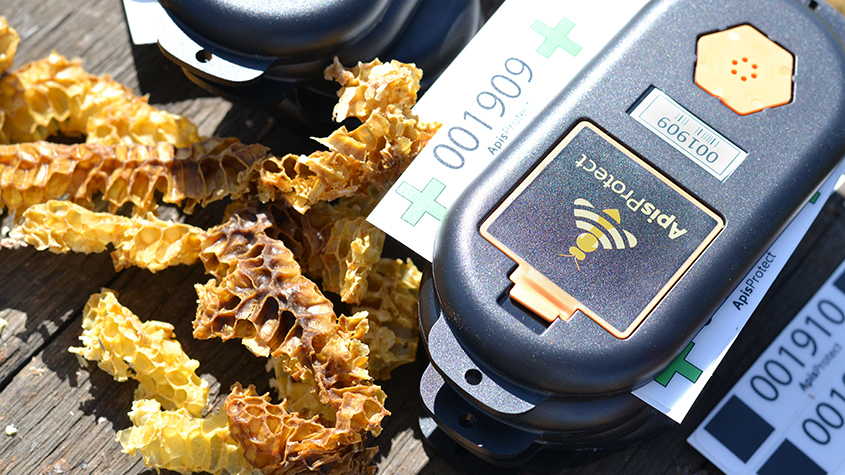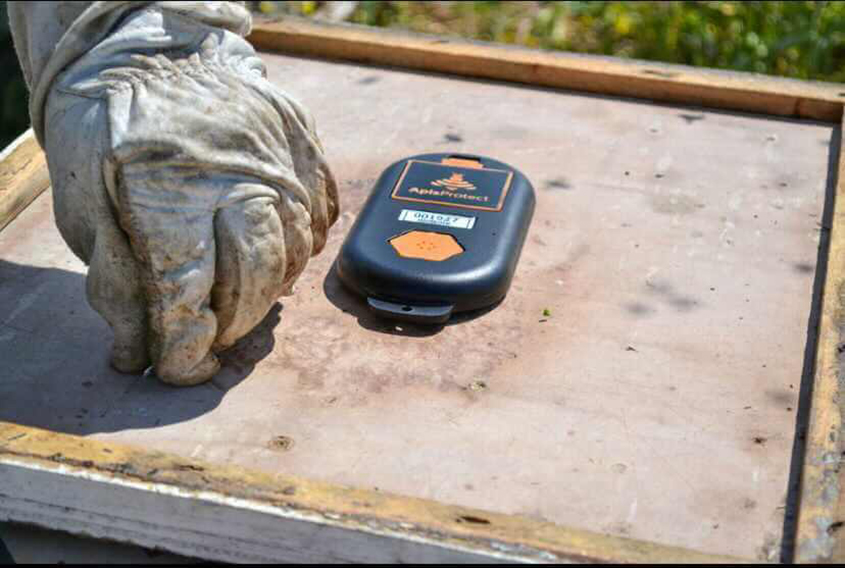

September 7, 2021
Meet Dr. Fiona Edwards Murphy, Chief Executive Officer (CEO) and Co-Founder of ApisProtect – a company that uses Internet of Things (IoT) and Artificial intelligence (AI) to improve commercial beekeeping.

ApisProtect’s technology extracts data from hives remotely through IoT, then subsequently utilizes AI to convert the data into meaningful insights about operations, enabling beekeepers to efficiently manage their labor and resources to produce maximal results. ApisProtect was recently listed by Think Business as one of the European Start-Ups to Watch in 2021 and as one of the 50 Irish Start-Ups to watch in 2021.
Short bio of Dr. Fiona Edwards Murphy
Dr. Fiona Edwards Murphy, CEO and Co-Founder of ApisProtect, is one of the most widely published authors on IoT and honey bees. She appears on the 2021 Forbes Europe's 30 Under 30 list in the Manufacturing and Industry Category – “Creating the products, methods and materials of tomorrow”.
What motivated you to become a green entrepreneur?
While looking for a subject on which to focus my PhD, I learned that beekeepers around the world were concerned about Colony Collapse Disorder – a phenomenon when the majority of worker bees in a colony disappear from the hive –, and wondered if anyone had explored the idea of putting sensors into beehives.
Preliminary research revealed that no extensive work had been done in the area, so I immediately applied to the Irish Research Council with a very strange request: to complete a PhD on applications of wireless sensor networks for honeybee health, as part of an interdisciplinary PhD with the Schools of Engineering and Biological Earth and Environmental Sciences in University College Cork. I was pleasantly surprised when they agreed to fund my research. That was the start of a very interesting journey that led me to co-found ApisProtect and to monitor honey bees across the world.

Do you think your project was funded because of the important role bees play in the ecosystem?
I am certain that it was one of the reasons. The pollination service provided by honey bees overall has a far greater economic and social significance than the sale of apicultural products alone. Bees pollinate one-third of the world’s crops, and the value of bee pollination to food production globally is valued at €153 billion annually. Currently, the production capacity of apiculture is not increasing, while the number of pollinator-dependent crops have tripled over the last decades. The production of 80% of the 264 crop species cultivated in the European Union depends directly on insect pollinators. In a survey of farmers from 10 European countries, 49% indicated that they experienced yield deficits due to inadequate pollination.
According to the Food and Agriculture Organization of the United Nations, in many countries, up to 41% of hives are dying annually. In the USA, beekeepers lost 40% of their colonies in the 2018/2019 seasons, the highest rate in 13 years. Moreover, since the late 1990s, a variety of honey bee diseases and pests such as the Varroa mite have threatened many of the 91 million beehives around the world. These problems have made the lives of beekeepers – supplying the over €8 billion honey market and over €1 billion crop pollination market – increasingly difficult.
With the help of IoT technology, ApisProtect is working to help secure the supply of one-third of the world’s crops, and to ensure we can nourish and feed the 9.7 billion people that are projected to live on planet earth by 2050.
What exactly is your invention and how will it help to overcome the bee crisis?
Beekeepers often rely on costly and time-consuming manual hive checks to understand their operation. However, our research shows that 80% of manual hive inspections do not require any action on hives but instead results in disruption to the bees and risks the loss of a queen. ApisProtect gives beekeepers an easy way to monitor the condition of their colonies remotely and in real time.
Our innovation combines the power of the IoT and AI for use in commercial beekeeping operations. IoT enables our unique combination of sensors to observe remotely the conditions inside the hive. AI analyses the raw data to provide actionable insights, which is meaningful information that allows the beekeeper to make well-informed decisions regarding a proper course of action. ApisProtect’s technology creates an extra $100 of value per hive annually.
As of today, ApisProtect provides the most robust, unobtrusive and cost-effective solution on the market to identify and respond to disease, pests and other hive problems. Overall, it alerts beekeepers immediately when specific hives need attention within their operation.

Does ApisProtect help businesses and farmers to adapt to climate change?
The effects of climate change are a major concern for both farmers and beekeepers. A study of 650 plants showed that, on average, the flowering period has advanced by 1.9 days per decade in the last century. If pollinators do not quickly adapt to this change, both the plants and pollinators will suffer. Remote monitoring allows beekeepers to optimise the placement of hives to match flowering periods, benefitting both the beekeeper and grower.
Moreover, using ApisProtect technology can help beekeepers to optimize logistics, reducing transport-related emissions by having more efficient and targeted intervention in remotely located hives rather than regularly scheduled inspections. Our technology also has the potential to facilitate reductions in the use of biocides by efficiently targeting hives that require treatment rather than mass prophylactic application at predetermined intervals, reducing dispersion into the surrounding ecosystem. Widespread adoption of the system has the potential to provides alerts when honey bee colonies are poisoned, acting as a sentinel for wider local ecosystem poisoning.
What is ApisProtect’s IP strategy?
We have been incorporating IP into our business planning process from ApisProtect’s inception to ensure that our innovations are protected. Over the past two years, we have worked with Enterprise Ireland, our national Government agency responsible for supporting Irish businesses to develop IP strategies. To date, it has enabled us to register ApisProtect as a trademark and resulted in an international patent application – patent pending.
What is your experience as a young woman in the green technology industry?
Being young and ambitious has been a huge advantage for me thus far; I have been able to commit considerable time and energy to running my company. The best advice I have received was to pursue my PhD while I was young and before I knew how hard it would be to walk away from the paycheck and security of a "proper" job. I think that same philosophy applies equally well to entrepreneurship. For all the young women out there who want to venture into green entrepreneurship, I would say: be brave! You will never know if you can do something unless you give it a try.
WIPO GREEN is a global marketplace for sustainable technology, supporting global efforts to address climate change. Through its online database and regional activities, WIPO GREEN connects green tech seekers and providers in order to catalyze green innovation and accelerate green tech transfer and diffusion. Subscribe to the monthly WIPO GREEN newsletter.